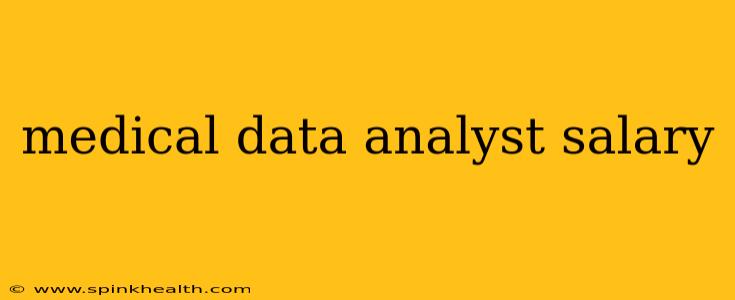Decoding the Dollars: A Deep Dive into Medical Data Analyst Salaries
The world of healthcare is undergoing a massive transformation, fueled by the ever-increasing volume of patient data. At the heart of this revolution sits the medical data analyst – a crucial role bridging the gap between raw information and actionable insights. But just how much do these in-demand professionals earn? Let's unravel the complexities of medical data analyst salaries, exploring the factors that influence compensation and answering some burning questions.
Imagine this: Sarah, a bright, dedicated medical data analyst, spends her days immersed in complex datasets, identifying trends that could revolutionize treatment plans. She meticulously analyzes patient records, uncovering patterns that might lead to earlier diagnoses and more effective therapies. Her work is not just about numbers; it's about improving lives. But what's the financial reward for this vital contribution?
Factors Influencing Medical Data Analyst Salaries:
Several factors play a crucial role in determining the salary of a medical data analyst. These include:
- Experience: Entry-level analysts naturally earn less than those with years of experience under their belts. As expertise grows, so does earning potential.
- Education: A master's degree in biostatistics, public health, or a related field often translates to higher starting salaries and greater career advancement opportunities.
- Location: Salaries vary significantly based on geographical location. Cost-of-living differences in major metropolitan areas versus smaller cities significantly impact compensation packages. High-demand areas like Silicon Valley or Boston's biotech hub often command higher salaries.
- Company Size and Type: Large healthcare systems or pharmaceutical companies tend to offer more competitive compensation compared to smaller practices or startups. The type of organization also matters; a research-focused institution might offer a different salary structure than a clinical setting.
- Specific Skills: Proficiency in specific software (like SAS, R, or Python), advanced statistical modeling, and experience with big data platforms all increase a candidate's marketability and, consequently, their earning potential.
What are the average salary ranges for Medical Data Analysts?
While precise figures fluctuate based on the factors mentioned above, a general range can be observed. Entry-level positions might start around $60,000 annually, while experienced analysts with advanced skills and education can earn upwards of $120,000 or more. This is a broad estimate, and the actual salary will depend on the individual's unique circumstances.
What is the job outlook for medical data analysts?
The job outlook for medical data analysts is exceptionally promising. With the healthcare industry’s increasing reliance on data-driven decision-making, the demand for skilled professionals is only expected to grow. This makes it a career path with excellent long-term prospects.
What are the typical benefits offered to medical data analysts?
Beyond salary, medical data analysts typically receive a comprehensive benefits package. This often includes health insurance, retirement plans (401k, pension), paid time off, and potentially professional development opportunities. The specifics will vary between employers.
What skills are essential for success as a medical data analyst?
Success as a medical data analyst demands a blend of technical and soft skills. Essential technical skills include proficiency in statistical software, database management, and data visualization. Crucially, strong analytical thinking, problem-solving abilities, and data interpretation skills are paramount. Excellent communication skills are also essential for effectively conveying complex findings to both technical and non-technical audiences.
How can I increase my earning potential as a medical data analyst?
Continuously upskilling is key. Pursuing advanced certifications, specializing in a niche area within medical data analysis (e.g., clinical trials data), and networking within the industry can all lead to increased earning potential. Demonstrating a commitment to lifelong learning enhances your value to employers.
The journey of a medical data analyst is one of continuous learning and significant impact. It's a field where analytical prowess meets a deep commitment to improving healthcare outcomes. While the salary is a crucial aspect, the rewarding nature of the work itself makes it a compelling career choice for many.

